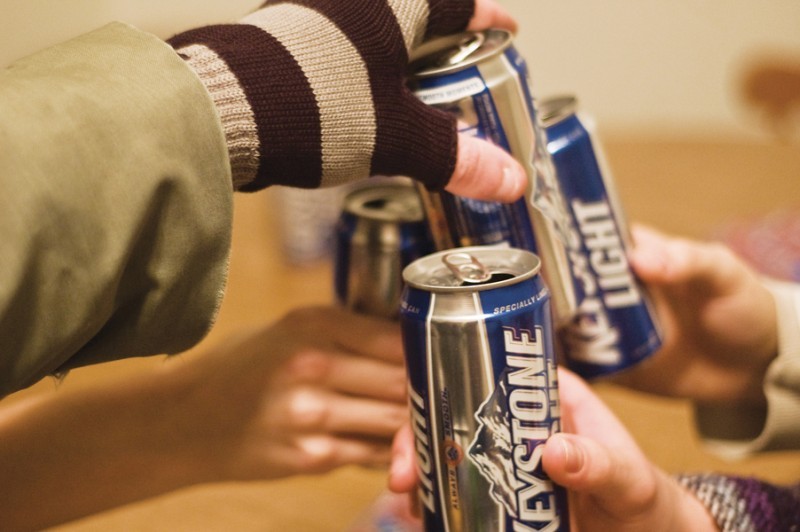Drinking age should be lowered
File photo illustration: Logan Gaedke/Iowa State Daily
The old adage, “if you’re old enough to go to war, then you’re old enough to drink,” is more than a casual attempt at validation. Drinking laws need to be re-evaluated to accommodate the changes in society.
October 21, 2010
When a person turns 18, the government legally considers that person an adult. From this, one can infer that adults are generally mature and responsible people. Therefore, it is not unreasonable to agree that responsible people should be allowed to get married, adopt children, purchase firearms, join the military to fight for your country, buy and sell stocks, serve on a jury or enter into a legally binding contract. Indeed, all of these things are allowed by law.
By virtue of the 26th Amendment, an individual even has the right to vote at age 18. Yet, in the United States, you have to be 21 years old before you are legally allowed to consume alcohol. You would be hard-pressed to concoct some odd rationalization that bridges the disconnect between the numerous rights I listed above with the fact that our nation’s drinking age is placed three years later than our age of majority. This difference in age limit is both inconsistent and duplicitous.
The legal discrepancies notwithstanding, there are other reasons why the drinking age should be lowered to 18. Dozens of other countries have set their legal drinking age at 18, including: Argentina, Australia, Bolivia, Brazil, Chile, China, Columbia, Costa Rica, England, France, Germany, Ireland, Israel, Mexico, North Korea, Panama, Poland, Puerto Rico, Russia, South Africa, Spain, Switzerland, Turkey, Uganda, Venezuela, Zimbabwe and Canada, in three provinces. Age 18 is the most commonly applied drinking age in the world.
In addition, there are several countries where the drinking age is as low as 16, such as Greece, Italy and Portugal. These countries must have had contentious debates about the issue before enacting their legislation.
To those who have concerns on how this change would affect our society, I say this: Until 1984, the United States was on that list of countries I listed. I see no reason why the people of the United States could not handle this social change as well as any other country. Of course sociological concerns should be addressed; such a far-reaching legal change would need to be balanced against a viable social policy. Undoubtedly, the change would need to be implemented in tandem with a well-organized program of some sort. I propose the creation and implementation of a major alcohol education initiative.
This initiative would include the integration of alcohol education into our public schools, accompanied by the creation of a certification system wherein young adults would be required to complete a post-secondary — meaning one would need to have a high school diploma in order to enroll — course to earn a license. This license could be revoked should someone decide to make an irresponsible decision: supplying alcohol to minors, driving while intoxicated and so forth. This fostering of knowledge coupled with a program that encourages the reduction of access minors have to alcohol would sufficiently ease the transition.
Speaking of the sociological implications: Lowering the drinking age would reduce teenage drinking.
Is it not human nature to desire what one cannot attain? An unfortunate propensity, I grant you, but one that exists nonetheless. The fact that college kids are unable to legally consume alcohol causes many of them to want a drink even more.
In the 1920s, many thought prohibition laws would reduce alcohol consumption. A cursory understanding of history reveals that this law failed miserably; it caused alcohol consumption to increase to a degree we will never fully know about, as it happened behind closed doors.
When the 21st Amendment repealed the 18th Amendment, drinking came out from behind those closed doors, and we were able to reasonably discuss our collective level of alcohol consumption in public. This situation is entirely analogous to the issue at hand: Lowering the drinking age would take away the notion of immoral indulgence, or the “forbidden fruit” aspect, if you will. It would promote a more open environment in which young adults can learn about and discuss alcohol. I am confident that the implementation of my above suggestions would lower overall consumption.
The National Minimum Drinking Age Act of 1984 essentially set the legal drinking age in the United States to 21 by requiring states to raise the drinking age. If a state chose not comply, that state would forfeit 10 percent of its federal highway funds. The legislation motivated all 50 states to change their laws regarding the purchase and public possession of alcohol — the bill was not concerned with private consumption; states still differ on that today. Within a few years, all 50 states had complied.
While I am sure the bill was passed with the best of intentions at the time, it has undoubtedly failed to adapt to the ever-evolving societal norms that accompany new generations. Cultivating some useful and open discussions about this issue would be beneficial for society at-large.

















